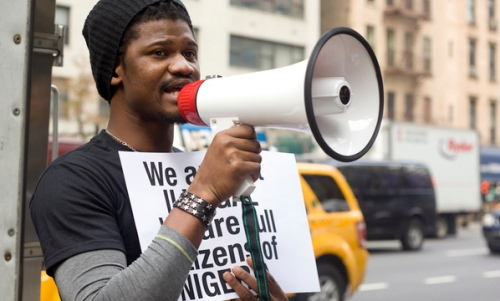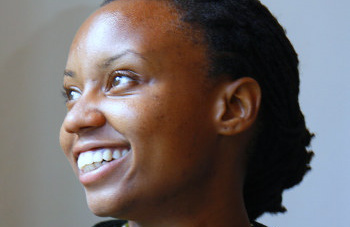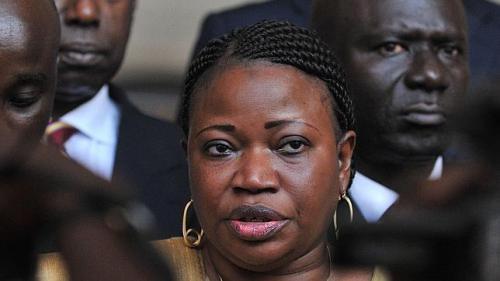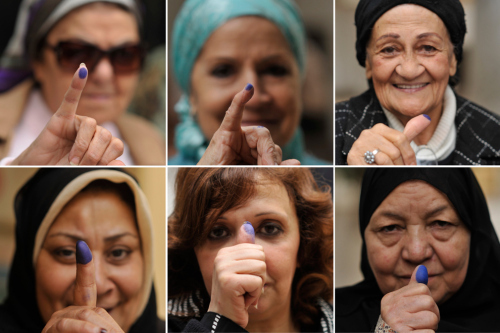Sean Jacobs's Blog, page 584
December 9, 2011
Adapting African literature for the screen
In a recent video interview (first spotted on film blog Shadow and Act), Kenyan film director Wanuri Kahiu revealed her participation in an exciting new film initiative ImagiNations. Under the helm of South African producer Steve Markovitz, the producer of hit Congolese film 'Viva Riva!' (2010) and producer of Kahiu's own sci-fi short 'Pumzi' (2009), ImagiNations is a "pan-African project," with "a series of six feature films based on contemporary African literature."
In the Shadow and Act interview, Kahiu explains that each director will adapt a different book from the cannon of African literature. She will take an East African story, the implication being that each story will be from a different part of the continent. BTW, at a New School event in Manhattan, where Kahiu was interviewed by Sean–more on that later–she added that one story would originate from "each region" and her film would be "a love story."
The initiative is a collaboration between Markovitz and Djo Tunda Wa Munga, the writer/director of 'Viva Riva' under the umbrella of their company Suka! Productions (they appear to be fond of exclamation marks). It's a high-powered partnership after the success of their Congolese noir, but this recent revelation is an exciting prospect for African filmmaking, for in the spirit of Kahiu's own foray into sci-fi, it proposes a radical expansion of the scope of African filmmaking.
Adaptation is a brilliant means of linking the wealth of African literature with different media, making stories available to different, and perhaps wider audiences. Lindiwe Dovey, writer of African Film and Literature: Adapting Violence to the Screen (2009) analyses a number of African films that are adaptations of both African and non-African literature, and argues that film adaptation develops both a distinct filmic identity, while engaging with narratives and aesthetics that transcend cultural and geographical lines.
Quoted in Dovey's book, the filmmaker Gaston Kabore says: 'The desire for pan-Africanism undoubtedly has something to do with a sense of shared, past oppression at the hands of the colonizers and, in film terms, it marks Africa as a continent that 'is trying to reappropriate its image'." Reappropriation, innovation and expansion in the kinds of narratives that are being portrayed is an exciting means to defy stereotypical 'genre' expectation of African cinema, and adaptation seems to be an engaged and rooted means of achieving this.
Markovitz has already proved through his involvement with 'Pumzi,' Kahiu's sci-fi short film, that he is capable of film projects that expand the scope of African cinema, so this ImagiNations project is something to keep an eye on, particularly when the texts to be adapted, and the other directors are confirmed.








The new sheriff
About a week ago, the International Criminal Court announced that Fatou Bensouda would succeed Luis Moreno Ocampo as Chief Prosecutor. This could be big news, but you wouldn't know it from The New York Times, who barely reported the announcement.
Fatou Bensouda is from Gambia. And she means business. Some people think she may be exactly what is needed to set things right.
As a woman, as an African woman, she's had it with waiting for the world to recognize violence against women as a crime against humanity.
According to Bensouda, part of the problem of addressing sexual and gender violence has been the logic of inevitability. By this logic, rape happens as an "incidental" and "necessary" part of the machinery of warfare. It's like "tradition". The word absolves practitioners, and everybody else, of responsibility as it cleanses the field of any history. Bensouda argues that the military use of sexual violence does have a history of change. For example, in recent years, it has begun to be used systematically as a weapon of war and as "part of the military machinery to fuel the fighting soldiers."
But the core of the refusal to address sexual and gender violence is the refusal to care about women:
Outside a prison context, targets of gender crimes are overwhelmingly female. The victims of certain crimes, such as forced impregnation and forced abortion are exclusively women and girls. This may explain why the progress made globally in recognizing, prohibiting, and finally enforcing gender crimes perpetrated in armed combat has been extremely slow.
The world has been extremely slow to address sexual and gender crimes. Not 'Africa'. Not 'Africans'. The world. African women, like Bensouda and like the ICC women judges from Mali, Ghana, Kenya and Botswana, join with women around the world in being fed up. In an interview two years ago, Bensouda said, "I am speaking as an African woman… And the African woman's voice is getting louder and louder, whether as advocate or whether as a victim." Individually louder and louder. Collectively louder and louder.








Helping Themba
The Dutch 'Stop Aids Now!' campaigns have a long tradition of appealing to potential donors in Holland's streets. November and December are the months the posters and TV ads pop up (around World Aids Day on December 1, coinciding with the arrival of Saint Nicholas and his Black Petes, and the ensuing spending spree) — staple NGO tactics this time of year. With governments slashing their international aid budgets, the street is where NGOs will need to scrape their money together. So you tell the Dutch that African kids "Mary and Neema don't know how to prevent AIDS, but you do." Or you show them (as in the video above) that while Dutch Alex wants a video game and Esther and Kim want a skippy ball, Themba wants to know "whether kissing will make you HIV positive," and that "Ayanna wants a long and healthy life." A reader suggested it was a rather patronizing and regressive campaign. She's being too kind.








December 8, 2011
Music Break. Iyadede
We like stylish Rwandese-Brooklyn singer Iyadede's take (in French) on the Theophilus London song "Flying Overseas." His verses (in English) are retained unchanged in Iyadede's cover. The video also visits some of the sites of Brooklyn. (Yes, there's some Manhattan in there.) The Brooklyn tourism bureau should pay the makers of the video. Next time, visitor, get on the subway and cross the bridge to the 4th largest city in America. And no French is not the lingua franca in Brooklyn (unless you speak Creole).








'A Family Tradition'
Robert Mackey's The Lede over at The New York Times has an update on the detained Egyptian blogger Alaa Abd El Fattah:
Early on Wednesday, Mosireen, a media collective in Cairo, added a short report on the activist blogger Alaa Abd El Fattah to its YouTube channel.
Mr. Fattah, who blogs as @Alaa, was arrested in October after he wrote that Egypt's military rulers were responsible for the deaths of Coptic Christian protesters during a demonstration in Cairo that month. He was taken into custody for refusing to acknowledge the authority of the military prosecutor who had placed him under investigation.
The blogger appeared in court on Monday, to hear that his request to be released from detention had been turned down by the authorities.
Because his appeal failed on Monday, Mr. Fattah was not present on Tuesday when his wife and fellow blogger, Manal Hassan — @Manal — give birth to their first son, who was named Khaled, in memory of Khaled Said, an Egyptian whose death at the hands of police officers led to a Facebook campaign for justice that helped spark the Egyptian revolution.
The video has no narration, but simply shows Mr. Fattah with his wife, mother and friends in court on Monday (in footage that was filmed secretly) and then the scene the next day, after the birth of his son.
As some of his fellow bloggers have noted, the birth of Mr. Fattah's child while he was in detention continues something of a family tradition. Mr. Fattah's sister Mona Seif, a leader of the campaign to end military trials for Egyptian civilians who blogs as @Monasosh, was born while her father, a human rights lawyer, was in jail for his activism.
Alf mabruk, Alaa and Manal. We follow new reports and hope for Alaa's release as well as the release of all victims of the military council before the new year.








Islamismisms
Not unsurprisingly, the news that the Muslim Brotherhood's Freedom and Justice Party along with Salafists received the bulk of votes cast in Egypt's first elections since the ouster of Hosni Mubarak, was met with dismay by our friends in the media.
"What does this mean!?" pundits on CNN, Fox and whatever other useless channel you're watching asked.
"Leftists" in the U.S. lamented, as though women would be disappeared–or collectively thrust under a 'veil'– the very next day. Conservatives were quite jolly: the Mooslums are taking over! We told you it would happen! And let's not mention the Zionists: well, what election result in Egypt isn't a threat to 'democratic' Israel's freedom to illegally occupy Palestine?
But we shouldn't be surprised at the movement of religious parties into power.
The Brotherhood were one of the only viable parties during Mubarak's 30-year reign. With impressive funds and the numbers to outlast the misfortunes that Mubarak's opponents seemed to face so often, the Brotherhood was expected by Egyptians to pull strong numbers in the election. As journalist Bobby Ghosh points out in Time, this is not an uncomplicated position they occupy, but it is the matter of the fact.
Essam el-Arian, leader of the Muslim Brotherhood, commented that these first (relatively) free elections, lively with debate and disagreement, will inspire "increased co-operation for the greater good of our country; and the stability of Egypt, its transition to democracy and building of a democratic society." In another opinion piece in the Guardian, Wadah Khanfar (the former director general of the Al Jazeera network) attempted to clarify what "Islamism" is in an opinion piece for The Guardian:
"Islamist" is used in the Muslim world to describe Muslims who participate in the public sphere, using Islam as a basis. It is understood that this participation is not at odds with democracy … This disconnect in the understanding of the term in the west and in the Muslim world was often exploited by despotic Arab regimes to suppress Islamic movements with democratic political programs.
Khanfar calls for concessions from both Islamist parties and those (particularly in the West) who oppose them, but whether this will proceed smoothly remains to be seen. Coalition building will be essential to the future of Egypt and any democratic vision its citizens and leaders are attempting to build.
The Egyptian military is well aware of this. In a press conference to "a group of almost exclusively American journalists" that "did not include any representatives of the Egyptian news media," General Mokhtar al-Molla catered to U.S. fears of "Islamism" by promising the military council will "approve" all constitutional changes before they are put in place. Using almost the same language Mubarak did to defend his dictatorship, al-Molla declared Egypt is too "unstable" for citizens to have made truly wise electoral decisions on their own.
Egypt's military leaders are not even pretending to be on our side anymore. And given the port workers in Suez who refused to accept a delivery of 21 tons of tear gas from the United States intended for the Ministry of the Interior (notorious for torturing activists under Mubarak and under the current military rulers), I doubt we have to worry about "Islamists" or anyone else "hijacking" the anti-SCAF movement anytime soon. The military will not be gently persuaded to give up power (Egypt has been under military rule since the 1952 coup), and all factions – religious or not – must participate in bringing them down. We cannot have truly free elections in a country that is not truly free. We need time to foment real and sustainable political parties to bring down the army's regime, not depend on an indistinguishable two-party model – the sort the United States boasts. Time–and the inexhaustible energy of Egyptian activists–will tell what this election will mean for the future of Egypt.








December 7, 2011
Music Break. Raashan Ahmad
This video for Raashan Ahmad left me wondering why I have never taken the train to Poland. It was recorded in Poznań, while Ahmad was on tour there recently.








Nigerian Nation Branding

Last month the writer Chinua Achebe declined the Nigerian government's attempt to name him a Commander of the Federal Republic. He had rejected the same award in 2004. Achebe's main objection then was widespread state corruption. He noted that "the reasons for rejecting the offer [of the award] when it was first made [in 2004] have not been addressed let alone solved. It is inappropriate to offer it again to me." Achebe could not have planned the next move of some key members of Nigeria's political class. Fresh from that rejection, the members of Nigeria's Senate decided to pass a new Prohibition of Same-Sex Marriage Bill which advocates jail time–up to 14 years–for same-sex couples who decide to marry or live together. The BBC reports that "…those 'witnessing' or 'abetting' such relationships would also face custodial sentences, and groups that advocate for gay and lesbian rights could also be penalized … Before it becomes law, the bill must be passed by the lower chamber, the House of Representatives, and then signed by the president."
The bill could not come at a worse time for gays in Nigeria, already subjected to harassment, hate crimes and death. (See also this video we posted earlier.) Activists point out that they have never agitated for gay marriage on Nigeria's law books.
Why is going after a small minority a priority for Nigeria's political class? Here are some choice quotes from one of the senators, Ahmed Lawan:
This is to be pro-active so no-one catches us unaware … We are protecting humanity and family values, in fact, we are protecting civilization in its entirety … Should we allow for indiscriminate same-sex marriage, very soon the population of this world would diminish.
As the BBC reported this week, Lawal's views are "moderate compared with some of his peers" in the Senate.
And a quick read of comments to recent posts defending gay rights–whether Richard Branson or Nigerian blogger Linda Ikeji–points to how deep-seated and widespread homophobia is in Nigeria. As journalist Chude Jideonwo wrote on CNN's African Voices blog:
Barely 10 days ago, the influential Nigerian blogger Linda Ikeji, shared what was supposed to be a touching story about a young man, Rashidi Williams, who had faced physical abuse for his sexuality. The comments that followed made my heart sink — more threats of violence and death. And it wasn't a fringe minority; this is a thriving majority.
Not all Nigerians are like this though. A few gay rights activists here in New York City (I know it is safer to do so from a distance) took to the streets–well, to the sidewalk–in front of the Nigerian Mission to the United Nations to protest the new law. In the video–below, shot by one of my students, Travis Ferland–I especially enjoyed the comments of a man that wandered into the frame around the 1:27 mark.
BTW, this all becomes a useful pretext for what a friend aptly describes as 'human rights imperialism.'








Viral Culture: The 2-year old rapper
By midday today almost 120,000 people had viewed the video of 2-year old Khaliyl Iloyi, the son of rappers Roucheon Iloyi and Femi Iloyi (aka smooflow), who together form British rap group Royal Priesthood. I agree with Boima: little Khaliyl makes more sense than half the corporate rappers out there.








Car Commercials and Primitive Peoples
It could have been just another dull TV ad featuring an Inca boy, Maori warriors, or Maasai dancers–heck, why not throw them all in there–and filed as such in the archives of car-plows-through-exotic-river-bed commercials.
But then we find out through this making-of clip "no Indian was hurt during the shoot" (around the 3:00 mark: "…nenhum índio foi ferido na filmagem"). So, now this commercial becomes something else. It becomes a reminder of Brazil's past and present fraught with racial discrimination and we forget what the ad was trying to sell.








Sean Jacobs's Blog
- Sean Jacobs's profile
- 4 followers








